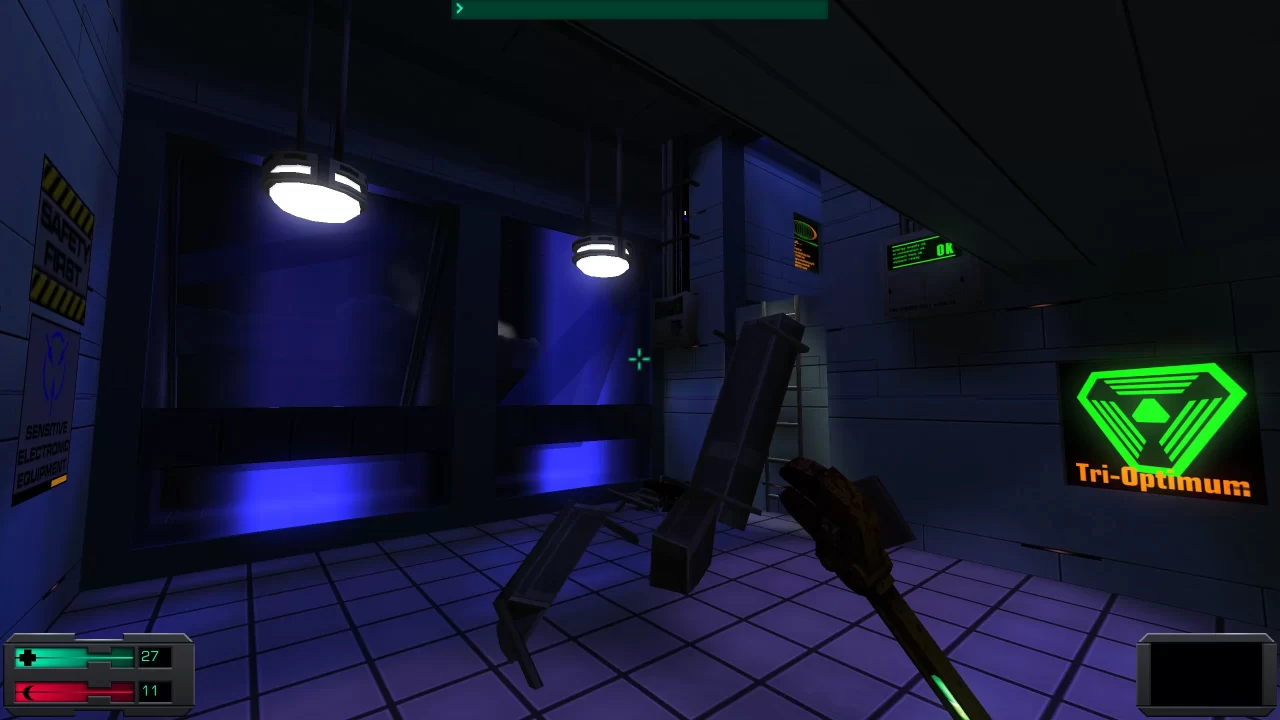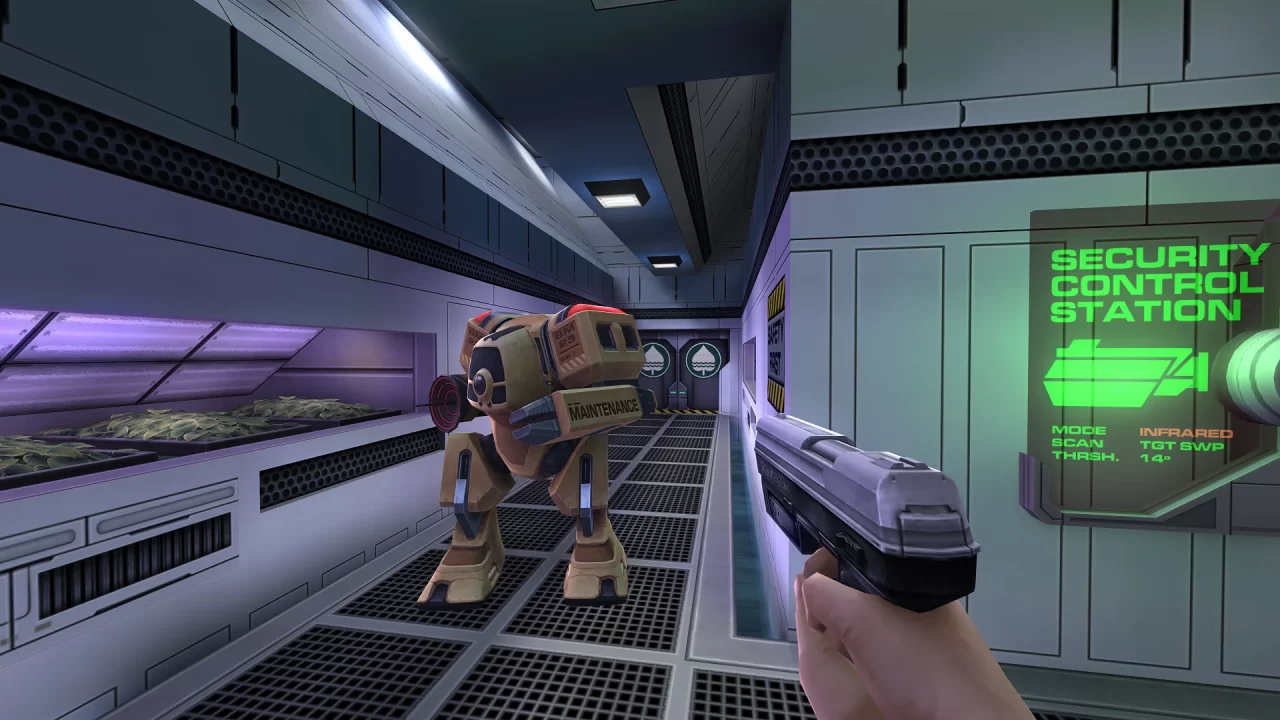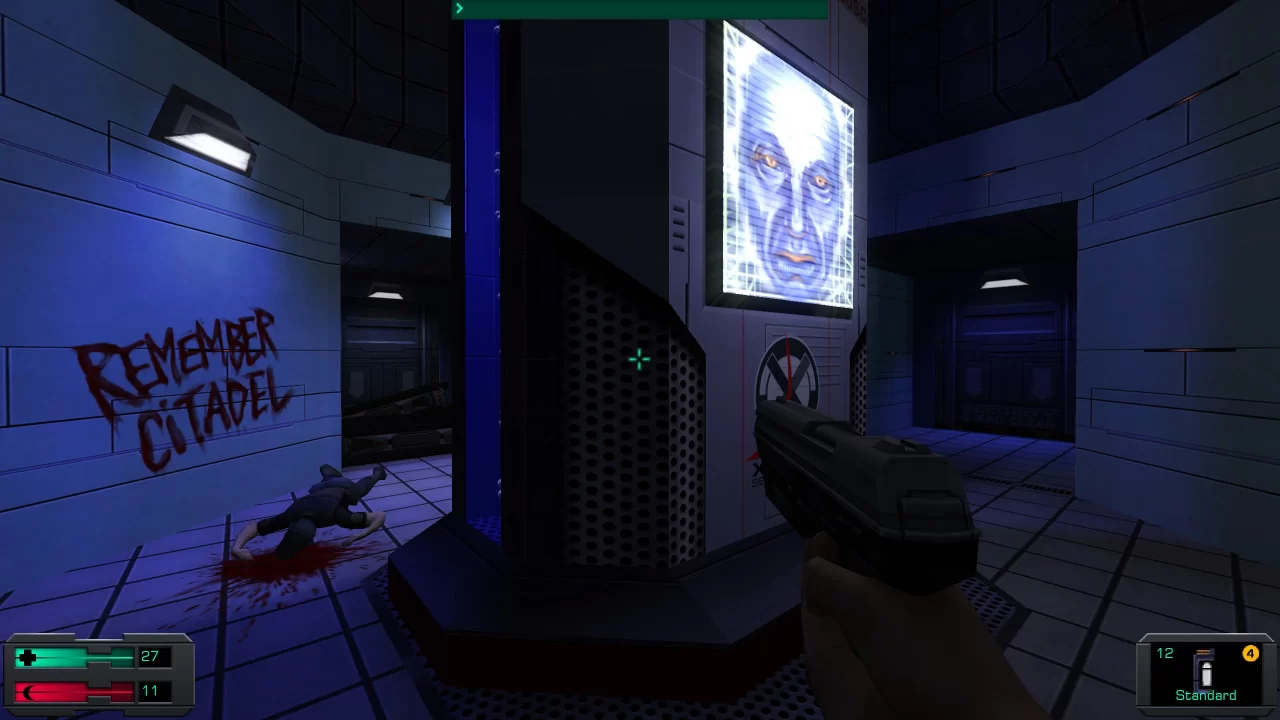For many years, System Shock 2 was one of gaming’s white whales, at least where digital distribution was concerned. A combination of rights issues and a hunt for the source code spearheaded by dedicated fans meant that the game would not see an official release, digital or otherwise, until 2013. At this time, Stephen Kick of Nightdive Studios acquired the rights for it and negotiated to get the game put onto GOG, a store that is famously the home of older, previously forgotten classic PC titles.
Since then, Nightdive went on to release an ‘Enhanced Edition’ of the original System Shock, followed some years later by a full-on Unreal Engine 4 remake, to moderate critical and commercial success. Meanwhile, fans of the second game eagerly waited to see it get a similar treatment, as Nightdive promised in 2019. Though it took a couple more years to finally come to fruition, the System Shock 2: 25th Anniversary Remaster (technically 26th, but who’s counting?) has landed!
So, is it the best version of this game? Well, it certainly seems that way! Truth be told, System Shock 2 has been my personal gaming white whale as well. I bought and played the re-release on GOG as a teen, way back when it came out, but I was a little too overwhelmed by the game’s systems and gameplay to fully engage with it properly. I put it on the back burner for many years.
Cut to now, and having just completed my first ever playthrough, I can safely say that System Shock 2 holds up in 2025, and then some. What’s more, Nightdive’s 25th Anniversary Remaster does a (re)masterful job of preserving the original look and experience while adding more than a few little touch-ups here and there.
System Shock 2 takes place 42 years after the events of System Shock, with the destruction of Citadel Station and the supposed defeat of the rogue AI, SHODAN. While on its maiden voyage, the starship Von Braun, accompanied by a UNN military vessel, the Rickenbacker, responds to a distress signal on the planet Tau Ceti V. There, they encounter a parasitic alien collective who call themselves “The Many.” The Many then proceeds to infect almost the entire crew of both ships, even the Von Braun’s onboard AI, Xerxes.
You play as an unnamed soldier, whose training and assignment(s) you choose during the game’s opening act. As one of the last remaining people on the ship unmolested by The Many, the Von Braun’s lead scientist, Dr. Janice Polito, tasks you to excise this threat before it has a chance of using the ship as a conduit to infect nearby human settlements.
As you journey through the ship’s many steel corridors and weave through sections of dangerous machinery and scattered debris, all the while fighting or fleeing from the mutated hordes, you hear the stories of the ship’s once-human crew before, during, and after the discovery on Tau Ceti V.
These audio logs are, for the most part, well told and well delivered, with a few sketchy performances here and there. You may get attached to certain crew members and their stories, and can potentially even find them (or what remains of them anyway) during your travels across the ship, which makes the logs all the more captivating to hunt down, floor by floor.
There is, however, one especially notable point, besides the fact that the Von Braun is an excellent setting to inhabit. It is, after all, one of the most, if not the most, famous things about System Shock 2, so much so that I was already aware of it before playing. That is, of course, the story’s big twist.
As it turns out, Dr. Janice Polito, the woman who has been guiding you and chaperoning you throughout the Von Braun, has been dead the whole time. The voice on the other end of the comms belongs to none other than SHODAN, the rogue AI that terrorised Citadel Station in the first System Shock and who was presumed destroyed.
It truly speaks to the quality of System Shock 2‘s narrative that, despite being aware of that twist ahead of time, it didn’t lessen my enjoyment of the story, nor the impact of that reveal. If anything, it only highlights how cleverly and sneakily they hide it from the player, leading up to that moment. Since you’re hearing audio logs from the ship’s crew, that also includes Janice herself. You start to notice that her voice on the tapes sounds starkly different to the voice that is guiding you over your comms, which may well clue you in ahead of time, or just slip by you and make the reveal hit harder.

There are a lot of systems and mechanics at play in System Shock 2, a fact that initially intimidated me and prevented me from playing it for many years. Now, with more RPG and immersive sim experience under my belt, especially having just played the remake of the first game, I came to see that, while playing System Shock 2 may seem like jumping into the deepest end of a freezing cold pool, once you adapt to how it feels, you’d be surprised at how quickly you become acclimated to it.
The opening hour of the game is tutorials and building your character in a very immersive, diegetic way. Since you’re a soldier stationed on the Von Braun, you’re taken through several training courses, easing you through the three main pillars of gameplay: Weapons, Technical, and Psi Skills.
The first is your standard first-person shooter crash course, acclimating you to the game’s arsenal, how weapon skills feed into your proficiencies with them, and explaining functions of the different types of weapons you may find throughout the Von Braun (Standard, Energy, Heavy, and Exotic). The second is a crash course in hacking, which allows you to bypass keypads and access locked rooms, hack vending machines to give you discounts and/or more items, and let you break into locked chests to (very occasionally) get lucrative loot.
The third and final training is a crash course in Psi abilities, which are new to the sequel. Using a strange metallic orb that’s hooked right into your arm, you can use psionic abilities like telekinesis, or you can conjure an energy shield around you for temporary protection. Psi skills are quite the investment, with a very involved, multi-tiered skill tree attached to it, so it’s generally recommended you either specialise in armaments or abilities for maximum enjoyment. You can, of course, mix and match, but you may have more fun going all-in ahead of time.
At least, that’s what I did. I played just under two hours of the game at first, specialising in Psi skills, before starting over and changing gears to weaponry. Not that the Psi skills didn’t seem fun to play with, far from it. It just seemed to me like more of a second-playthrough investment, and I was seeking more of a basic boots-on-the-ground gunplay experience for my first run.
Right after getting acclimated to the game’s systems and mechanics, you have the choice of which branch of the military you’d like your character to be a part of: Marines, Navy, or O.S.A. (Orbital Systems Agency). To put it plainly, they break down into gunplay, hacking, or psionics, respectively, as to what your character will get a head start in. Outside of the initial gameplay elements, it’s a largely arbitrary decision, serving mostly to fuel further roleplaying for the protagonist, if that’s your jam.
I initially chose the Marines, but changed to the Navy after realizing that hacking was much more my speed and seemed lucrative, aligning with the immersive sim experience I preferred to achieve in System Shock 2.
I would be remiss if I didn’t talk about what is perhaps my favorite, and the most consistently high-quality, part of System Shock 2: the atmosphere. If we’re talking about immersive settings in video games, where everything comes together in such a way that you cannot tear your eyes away from the screen for a single second because you’re so captivated by what’s fed to you, then the Von Braun in System Shock 2 would be near the top of that list, and I say so boldly, proudly, and with no hyperbole.
The sound design in this game is immaculate, from the terrifying screeches and groans that the mutant cyborg enemies in this game make as they come charging towards you to the unnerving creaks, bumps, and eerie ambient humming that the ship makes as you navigate its corridors, unsure of what horrors await you around every corner. This is further enhanced by Xerxes’ occasional announcements over the ship’s intercom, either eerily reading off bulletins as if nothing’s going on, or pleading with remaining crew to join The Many and become part of their hive.
Top it off with a toe-tapping, pulsating techno-synth-drum & bass score that matches the intensity of the game’s look and gameplay, composed by Eric Brosius, Josh Randall, and none other than Ramin Djawadi (who would go on to craft the iconic scores for Game of Thrones, Westworld and the Fallout TV series), and it becomes all too clear why System Shock 2 has been revered over the 26 years since its release, and why it’s re-release was the subject of such high demand and fervor once upon a time on the internet.

With all of these intertwining gameplay elements combining, it might surprise you that this remaster is compatible with controllers, which is how I played it. Yet, full credit to Nightdive here—despite a few hiccups along the way, they do manage to make it mostly work. There are quite a few UI elements to keep track of in System Shock 2, and it can be a chore to cycle through to the one you want, especially in tense situations. However, I still enjoyed their translation of the original’s mouse-and-keyboard experience to the controller experience.
The game’s crummy weapon degradation system highlights the mild frustrations. It still feels like a chore, even if you’re maxed out in the maintenance skill. It’s not exactly game-breaking by any means, but it can be irritating to constantly re-up your weapons’ condition, especially since they don’t last quite as long as you’d like them to last at full condition.
Visually, it still looks like a game from 1999, but in the best way. I wouldn’t have complained if it were a straight port and it looked exactly the same, but it seems Nightdive spent a lot of time and energy making System Shock 2 look fresh and crisp, while still unmistakably like a first-person RPG from the turn of the century. As I understand it, they even incorporated fan-favourite mods of the original game into the remaster to help achieve this nouveau-retro look, which is a decision that I’m always a huge fan of (provided there is respect to and permission from the original mod authors).
It’s truly a wonderful feeling when you get around to a game that you’ve put off for so long, especially one as revered as this, and come to find that it is every bit as incredible as you’d been promised for all these years.
Cheers to you, System Shock 2, for living up to your own hype. And cheers to you especially, Nightdive Studios, for bringing it back in such a loving, passionate way so that others may experience such a titan of gaming once again, or for the first time.





